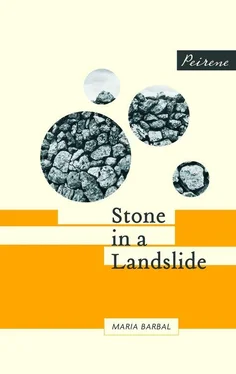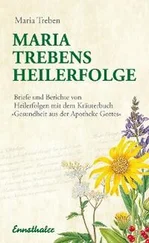Many times Elvira tore me from my thoughts and gave me a fright, something that made her break out laughing. She was growing up small but lively, with an energy that reminded me of Tia. She would come to take over from me so I could go and make dinner. Her teacher said she had a mind like quicksilver. I was delighted to think she would be able to look after herself better than I had in life.
One day in the meadow Elvira brought me some news. A letter had come from the cousins and Tia said she was thinking of going to Barcelona.
My heart jumped. Something terrible must have happened. Going so far away seemed such a dangerous thing to do. I went down the road as fast as my legs could carry me, as if I’d been told that the house was on fire. I’d left Elvira mid-sentence. I couldn’t wait to find out what was going on. On the road I met Delina coming back with her cows. I was lucky to have her to distract me from my thoughts. Lively as ever, she told me that her older brother would soon be a priest, which made her very excited. He had told her that if she still hadn’t agreed to marry someone by the time he had taken orders, she could keep house for him and take care of everything, from the holy vestments to the rectory. She would be well respected as the first lady of his parish. She knew that it would be a while before all this happened, but her life now had a direction, and she’d spent a long time without one. I still dared to say that in the meantime maybe some young man might want to marry her and she said No, God forbid. That she didn’t see herself being any man’s maid and that even the thought of it made her blood boil.
While I pondered what she meant by saying her blood would boil, I found myself threading through the first houses of the village and my former anxiety returned like a gust of wind. I bounded up the stairs three at a time and went to the kitchen. Tia was calmly peeling potatoes and Oncle was sitting by the fire with his pipe in his mouth. I knew then that nothing serious had happened and my first thought was that I wouldn’t say anything of what Elvira had told me in case it annoyed Tia. But she spoke as soon as she saw me. Now, my girl, the Exposition is on in Barcelona and my cousin has asked me if I want to go. I think if I don’t go to the capital now, I’ll never go before I die, so if you can take care of the house and the children, I’m going to go two weeks from now. She added that the Exposition would be like a warehouse of all the best things that were made in lots of the countries of the world. Oncle said: And of course you have to give them your approval. He didn’t say it in anger, but as if he felt envy that his wife was capable of being interested in something so unknown and far away…
All that meant nothing to him. Not that or even what happened in Montsent. Oncle liked the everyday and the routine more than anything else and Tia would often tell him off about it. If it were up to you, we’d all be living in just the one room in this house! She was exaggerating, of course.
Jaume wanted Elvira to go to the school in Montsent where they taught more reading, writing and arithmetic. He was anxious that she should learn as much as possible, and the great progress she had made the previous winter, as well as her teacher saying that she should go, decided it. The only thing holding her back was the hour and a half of walking she would have to do every day.
I told him that it might be good for her to learn to sew as well and he smiled. Of course! We thought it better to wait a little while and when Elvira reached the age of thirteen she could go into service in a nice house in Montsent and in the afternoon go to school for a few hours. That was what we said.
We’d gone out together, Jaume and I, to gather the animals from the side of Sant Damià mountain. It was a bright day and I felt as if I was looking at everything in a huge mirror. The wind was fresh, you could still make out the snow on the mountain tops, even though the new grass had come up some days before. The birches stretched their arms to the sky waiting for their soft foliage. We’d had to return early because I was looking after the house on my own. The girls stayed in the vegetable garden with Oncle while we went to bring the calves and cows back home.
We spent the time walking side by side and chatting. At night I would drop from exhaustion, but now I wanted to jump from one stone to the next to cross a stream or avoid a patch of nettles. The cows followed us, docile except when they found branches with new leaves on to eat. Then we had to tear them away and get them back on the road again. There was no need to worry about vipers, it was still too cold.
We went from speaking about the girls to things in general. Jaume said that he would have done anything to be able to go to Barcelona like Tia, that he was worried about the country’s future, about justice. He said that we were abandoned on the mountain, that no one remembered the sons of the land who lived so far from where everything was decided.
When we talked about such matters the same thing always happened to me. A thick fog came over my brain and from there it passed to my heart. It left me frozen and in the dark. I was made to know what I saw, to speak about what I felt. I didn’t know anything outside of Pallarès or Montsent or Ermita. I’d heard of Barcelona, of the sea, even of Madrid, of the King. It all seemed to me like one of the stories my father used to tell round the fire. I didn’t believe all that really existed. I thought it was a trick, like Soledat Estevet having a claim to the throne of England. Perhaps that was why when I saw Jaume’s eyes shining as he spoke of these strange things, the ground beneath me moved and I couldn’t find true north. Instead of me guiding the animals, it felt like they were leading me. At moments like this, Jaume and I were as different as night and day, and that difference made me tremble more than when he left to go away for a whole week’s work.
We arrived before it got dark. Thursday was ending and tomorrow was another day of work. That Sunday Tia would arrive with a face so radiant that I didn’t recognize her. Words couldn’t describe the Exposition and how well her relatives had treated her, especially Ventura, the daughter of her cousin Tomàs, who had walked everywhere with her.
She spoke of the pavilions, the gardens and so many things that couldn’t compare to anything we knew in Pallarès. Only to the mountains and rivers, perhaps.
Oncle became ill in the autumn. It seemed to be because of all the hard work in the summer, but winter was approaching and he didn’t get better. The doctor from Montsent said that if the burning sensations hadn’t eased by Christmas, he would visit again and prescribe something for him. Squatting in a corner, Oncle payed no attention to anything. He hardly spoke and he didn’t complain. He spent the odd while telling stories to the girls, but he did it when the grown-ups were busy far away from the kitchen. I never knew whether he liked doing this with the children or if he just wanted to help us. If he wasn’t well enough to work, then at least he would entertain the children so that we could work.
By All Saints’, Tia had begun putting an ointment made with snake oil and a blend of herbs on his stomach. I never found out where she’d got the recipe. Oncle let her do it but he didn’t get better. He barely ate and wasn’t sleeping at night.
We didn’t need the doctor from Montsent to come again after all. On 8th December, the day of the Immaculate Conception, Oncle abandoned us in the ship that he had helped to sail.
I don’t know if we always need to miss someone to know that we loved them, but that’s how it happened to me. While he was alive I didn’t have time to work out whether what I felt was love or a mixture of gratitude and concern. When he died, I felt pangs of love for this man who had for so long been a father to me. Maybe he hadn’t done it with enthusiasm, which wasn’t part of his character, but he had certainly shown good will. I promised myself I would make all my family happier and let them know I loved them and lived to make them happy. Above all poor Tia, who had become rather withdrawn despite her strong and active character.
Читать дальше












